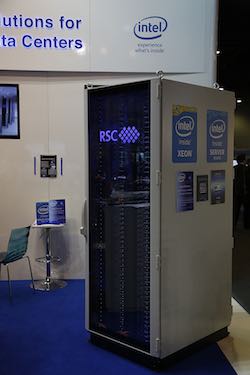 At ISC 2015 last week, Russian supercomputing vendor RSC Group showcased its next generation RSC Tornado cluster solution. Enhanced with higher computing density, energy efficiency, and operational stability “hot water” mode, the RSC Tornado reduces infrastructure while making it easier to upgrade system components.
At ISC 2015 last week, Russian supercomputing vendor RSC Group showcased its next generation RSC Tornado cluster solution. Enhanced with higher computing density, energy efficiency, and operational stability “hot water” mode, the RSC Tornado reduces infrastructure while making it easier to upgrade system components.
Unique extensive experience of RSC specialists in development of efficient direct liquid cooling technologies and ultra-high dense integration of supercomputer solutions based on standard server components enabled development and presentation of a new generation of RSC Tornado cluster solution with a number of improved characteristics that are highly demanded by customers using powerful computing centers,” said Alexey Shmelev, COO of the RSC Group. “In addition to computing and power density records set by our earlier solutions, the new generation of RSC Tornado has set world record of stable operation in “hot water” mode at +65 degrees Сelsius.
A number of customers are already using solutions based on RSC Tornado cluster architecture including: the St. Petersburg Polytechnic University named after Peter the Great (SPbPU), Joint Supercomputer Center of the Russian Academy of Sciences (JSCC RAS), South Ural State University (SUSU), and the Moscow Institute of Physics and Technology (MIPT).
The new generation of RSC Tornado cluster solution has the following improved characteristics:
- Improved physical density – up to 153 computing nodes per cabinet (previously 128),
- Improved computing density – over 200 teraflops/m3 on standard processors and up to 256 GB RAM per node,
- Improved reliability – independent hydraulic pump modules (hydraulic regulation modules) of the liquid cooling system per a computing domain (up to 9 modules per cabinet) with redundancy level from N+1 to N+N,
- Improved energy efficiency – provides necessary conditions for stable operation of computing nodes in “hot water mode” at +65 оC temperature at node output (setting current global record in the HPC industry),
- New power supply module in computing node form factor providing efficient transformation of 220V AC to 400V DC and supporting parallel operation on common bus,
- Updated design of computing cabinet with support of new high speed interconnect communication technologies including Mellanox EDR Infiniband, Intel Omni-Path,
- Intended support of future Intel Xeon processors and Intel Xeon Phi coprocessors (code named Broadwell and Knights Landing architectures).
The new generation of RSC Tornado is based on standard Intel server components including Intel Xeon E5-2600 v3 server processors, Intel S2600KP server boards, and Intel SSD DC S3500/3600/3700 solid-state drives for data centers.
Sign up for our insideHPC Newsletter.



